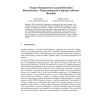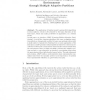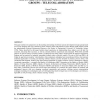1019 search results - page 12 / 204 » Managing Complexity in Large Learning Robotic Systems |
GECCO
2005
Springer
14 years 1 months ago
2005
Springer
This article describes a mathematical framework for characterizing cooperativity in complex systems subject to evolutionary pressures. This framework uses three foundational compo...
BTW
2007
Springer
14 years 1 months ago
2007
Springer
Abstract: With information infrastructures getting more and more complex, it becomes necessary to give automated support for managing the evolution of the infrastructure. If change...
ICAS
2006
IEEE
14 years 1 months ago
2006
IEEE
A modern server system must deliver a complex set of obligations towards its users. We study the concept of roles as autonomous encapsulations of a set of promises. Using virtuali...
AIIA
2007
Springer
14 years 1 months ago
2007
Springer
The application of Reinforcement Learning (RL) algorithms to learn tasks for robots is often limited by the large dimension of the state space, which may make prohibitive its appli...
IADIS
2004
13 years 9 months ago
2004
This paper outlines new perspectives on the teaching and learning of software systems development in large groups based on a newly designed, final year, Software Systems Analysis ...



